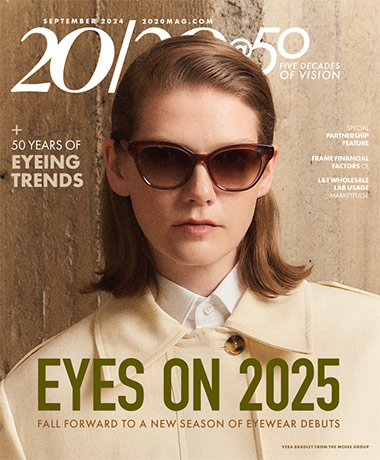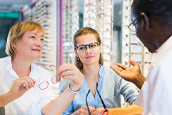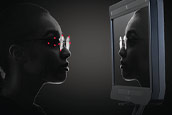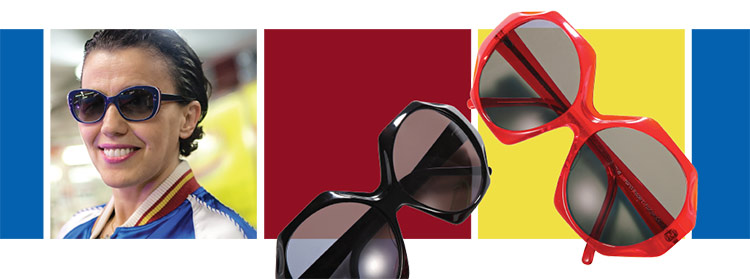
Photo of Selima Salaun by Anne Deniau
On a chilly afternoon, I left my office in midtown Manhattan to head downtown to Noho, the neighborhood bordering Soho, where 20/20 resided for over 25 years. Before I had a chance to let nostalgia sweep over me, I hurried inside Bond 07 by Selima, one of seven optical shops owned and operated by celebrated and beloved eyewear designer and retailer Selima Salaun. I was led downstairs to Salaun’s office to discuss her illustrious career.
A few steps down the stairs, I was greeted by an unexpected and loud “WOOF!” Initially startled, I was delighted to see it was just an adorable shaggy sheepdog excited for a visitor. “Totto” belongs to Marie Saeki, Salaun’s public relations manager. An animal lover who owns a few rescued pets, Salaun tells me her childhood dream was to become a veterinarian. But eyewear was already in her blood—her mother had been in the optical business for many years, owning an eyewear manufacturing factory and optical stores in her native Algeria. Naturally her parents already had her career path lined up. “Back in the day I couldn’t say to my parents I wanted to be a vet—they told me, ‘You go to optical school and that’s it,’” she laughs. Like a good daughter, Salaun dutifully followed in her mother’s footsteps and began her opticianry and optometric education. During her studies, an opportunity arose at Royal Optique, an upscale luxury optical shop in Paris catering to an exclusive clientele, and Salaun began working there, immersing herself in everything from eye exams, lens edging, custom frame orders to selling frames. It was here she realized she wanted to be the best at doing all of these things. “I decided, if I’m going to do this, I’m going to do it the best way I can.” With that she completed her studies and became a licensed optician, optometrist and contact lens fitter.
During her time at Royal Optique, Salaun convinced the shop to begin selling frames from renowned eyewear designer Alain Mikli, who she had long admired for his colorful, eclectic designs. With Royal Optique’s opening order of Mikli frames, Salaun sold the entire 36-piece collection to a high-profile client. Word traveled quickly back to Mikli, and he hired Salaun to work in his Paris boutique, where she became a brand ambassador of sorts, helping Mikli open retail stores internationally including New York City. “I was supposed to go to Tokyo after New York, but I fell in love with New York, and I decided to stay here.” And so began her love affair with NYC—Salaun left Paris to start her new life in New York, managing the Alain Mikli store, never looking back. It is here where her career blossomed in ways beyond her expectations.
Working with Mikli for a good number of years was a gratifying experience, but Salaun was ready to embark on the next chapter of her career. New designers were popping up on the eyewear scene, and they caught her eye. “There were so many new designers that I was in love with, and I wanted to explore them.” In 1993, Selima Optique, her first retail store opened its doors on Wooster Street in the Soho district of the city. Her goal was to sell a variety of eyewear brands in the store but it did not come easy initially. “A lot of people didn’t want to sell to me at first because I didn’t hwave a history, so I started with very few brands. But Alain Mikli gave me his whole collection on consignment, and some European brands gave me a chance. And someone I knew who became a great friend of mine distributed some brands here in the States, so that helped.” Salaun persisted and as her customer base grew, many of them requested custom orders, a skill she was familiar with from her experience at Royal Optique. This inspired her to produce a special collection of her own frames. “I wanted to do something fun, with big CatEyes and crooked and scalloped shapes. It was a small collection; I found an atelier in France to hand make each piece.” A woman came into her store one day and bought a few pairs—Salaun didn’t know who she was but soon after received a call from Barneys New York expressing interest in carrying her frames. She was flattered but she explained she didn’t have her own collection—these frames were only a special collection she did for her store. Barneys wouldn’t take no for an answer, becoming Salaun’s first wholesale account and even housing an in-store boutique merchandising the collection. Just like that the Selima Optique eyewear brand was born.
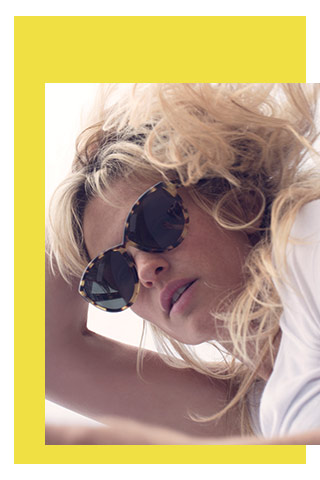
Photo by Dusan Reljin
Today Selima Optique eyewear is carried in specialty optical retail, fashion and department stores, and of course in Salaun’s own retail shops. She currently operates four stores in New York, one in Los Angeles, two in Paris, a pop-up shop at the Le Bon Marche Rive Gauche department store in Paris and a pop-up shop that opened recently at Forty Five Ten in Dallas. In addition to her own brand, the stores also sell other eyewear brands. “It’s fun doing your own collection and playing with colors and shapes, but I also love carrying other brands.” These include established brands and designers such as l.a.eyeworks, Barton Perreira and Dita but she also loves discovering new designers. “I love giving a chance to new designers—I’ve always done that and it works really well. It’s not that I like being the first to carry them, but I want to give an opportunity to new designers.” Vintage frames are also sold in the stores, as well as to wholesale clients; Salaun boasts one of the most extensive collections of vintage eyewear in the world and is solely responsible for finding and buying vintage frames for her stores.
Eyewear certainly plays the starring role in Salaun’s stores, but it also has a supporting cast. Unlike most optical shops carrying eyewear exclusively, some of her stores such as the Bond 07 and West Village stores also offer accessories including hats and scarves, as well as vintage clothing. “I like things that are unique, and I always like having eyewear in a lifestyle setting. I feel like it’s the least appreciated accessory but it should be the MOST appreciated accessory.” Salaun is disappointed when she meets people who can drop $1,000 on a pair of shoes but balk at spending $500 on a great pair of glasses. For this reason she makes eyewear the dominant and most important item in all her stores and makes other luxury items the accessory. “I accessorize the eyewear with accessories from Gucci, Chanel or Hermes, and it makes it even more royal in a way—and it works out really well for us.”
When it comes to inspiration for her eyewear designs and for her stores, Salaun draws on flea markets where she scores vintage finds, discovering little stores and finding unique things on social media. “I’m also inspired by old movies and their actors and actresses. One of the ateliers I worked with on my first collection made all the glasses for Catherine Deneuve in ‘Belle de Jour’ and Jackie Onassis. There was always this richness of amazing frames that were really inspiring to me, and I even remade some of them.” But her biggest inspiration is also her most important—her customers. “I feel very lucky to have my office in my store. I love being in the store because my associates call me if they need help with a customer. And my customers always give me input. I always say my stores are like my laboratory—I test my products, and I get excited when I see how people react, and then I put it in production.”
And her customers keep coming back for more—in 2016, the Selima Optique eyewear brand celebrated its 20th anniversary. To commemorate this occasion, Salaun relaunched a special collection of her best-selling frames that were the main staples of her collection from the past 20 years, reproducing the top timeless and iconic pieces including the Harley style, which was what Salaun considered her first “masterpiece.” In fact, many of the styles she designs remain staples in her collection years down the road. “It’s interesting but with my top 10 sellers every season, there are always at least six or seven styles that are from 10 years ago, and they keep coming back. When I started my business, I asked myself, ‘What do I want? How do I dress, what do I wear, what makes me happy? Of course it’s nice to have new things but I love mixing and matching vintage with new. I like things I can wear without you knowing when it was bought... it’s timeless. So I want to design things that are timeless, and then every season introduce something new, either a new shape or color, and we keep what sells best.”
Salaun excuses herself to pull some of the 20th anniversary pieces to show me and also brings back some frame samples from a collaboration she did a few years ago with up-and-coming eyewear designers and social influencers Coco and Breezy, who she met after spotting them on the street in the city. “I thought they were such amazing girls with great style, and I asked them to do a collaboration with me. I gave them the Onassis frame style because it was the easiest to work with, and I asked them to come up with their own take on it.” The twin sister duo put their own spin on the frames, resulting in uniquely wild one-of-a-kind pieces which Salaun then sold in her stores. The collection strayed from what her clientele normally gravitate to but Salaun took a chance on them and played a vital role in launching Coco and Breezy’s entry into the optical world. The twins have since introduced their own eyewear collection and debuted their namesake sunwear collection in 20/20’s July 2015 issue, and collaborated on a 20/20 Instagram takeover during a recent Vision Expo.
Salaun’s dedication to helping young designers can be traced back to early in her career. In a 2002 interview with 20/20, she was quoted as saying, “I would like to see more young independent designers with new ideas that might challenge the industry. We need competition from small companies.” Fifteen years later, her wish came true—the growth of independent eyewear brands have since increased exponentially. So much that she jokingly says perhaps she spoke a little too soon as she sometimes has a hard time keeping track of all the brands that are out there now. But overall, she believes this is a positive trend. “I think it’s super important and wonderful. I discover many new designers and brands at trade shows, particularly foreign brands, or people contact me and find me in my stores to show me their eyewear. I also see a lot on Instagram—I love that people all over are making incredible eyewear.” However, with the recent merging of industry giants and other manufacturing shifts with well-known luxury brands, she believes it can be difficult for many of these younger brands to compete. Which is why she continues to support many of these brands and help them penetrate the optical market, including Dom Vetro and Darylynn Eyewear, two brands hot in her stores right now.
For those who are just starting out or who aspire to design eyewear, she gives them sound advice. “I always tell people who want to design or those who approach us to work with us—it’s important to work for an optical retail shop and get the feedback from customers. It’s the best thing you can ever do. For me, someone who designs a collection but never interacts with the consumer, it doesn’t make sense because you need the experience.” She believes creativity in designing is important but it’s essential to be realistic, mentioning a young man who showed her designs that were too over the top. “I advised him to work in a store first and see what people want. That’s the best experience you can have, because if you want to be an eyewear designer, you better know what kind of proportions you’re working with.” She cites Darylynn Ayala as an example, who worked with her for six months in her store and truly gained a real-life perspective on the fundamentals of eyewear design, such as the importance of the bridge, etc. “It’s not only about looking cool, it also has to be comfortable. That’s the number one key for me when you design something. You can have amazing shoes but if they’re uncomfortable, you can’t wear them. It’s the same for eyewear.”
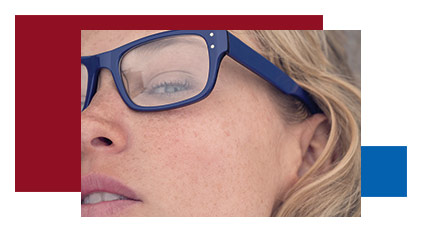
Photo by Dusan Reljin
As much as she loves independent and new brands, Salaun has a genuine appreciation for eyewear from all avenues of design and is drawn toward designs that push the envelope in eyewear. Her stores carry a diverse selection of eyewear brands ranging from unknown up-and-coming designers to optical heritage brands such as Persol to designer brands from luxury fashion houses such as Gucci and Celine. “I’m selective but I carry everything that I love. I carry different brands from different manufacturers; I don’t care who produces them. I love this industry, and I’m passionate about my job. But I don’t just think about myself, I think about what my client wants.”
Salaun feels that even with all the variety of eyewear options today, changing the consumer’s perception of eyewear is still a challenge. “When there are more and more designers in our industry, I think it’s great because as I said, I feel like we still aren’t strong enough as an accessory. We are the most important accessory, it not only makes you look good but it also helps you see better and protects your eyes, but people don’t understand that.” She believes that the craftsmanship on eyewear is higher than it has ever been and with more brands committing to the product and high quality design, and with retailers supporting them, she hopes the perception will change and people will value the importance of eyewear. She is actively involved in making this happen—having served on the board of the Council of Fashion Designers of America (CFDA) for many years, Salaun is also a founding member of the newly established Eyewear Designers of the CFDA (edCFDA). “I’m so happy about this initiative that we found with Christian Roth because again, it brings the eyewear industry a step up—in the CFDA, you have jewelry, shoes, hats, you have every category; and we are the first ones doing this. It’s making us stronger and more recognized in the fashion industry. In the past, the optical industry was very separated, we were always in between medical and fashion. It’s like we didn’t know exactly where we belonged. People were confused—the medical industry didn’t really embrace us, and the fashion industry didn’t either. We were in between. And now, the fashion industry totally embraced us, and we’re beginning to see a major focus on eyewear, and it’s fantastic.”
As we approach the end of our chat, I ask Salaun when she first opened shop 20-plus years ago and launched her own eyewear collection, did she ever imagine this is now where she would be. “You know, it’s been quite a ride, I would say. I’ve had ups and downs... I’m one of the few companies who is still totally independent and privately owned. I have no investors. It can be challenging sometimes, especially with the rise in costs; for example, my Soho store is now 10 times more expensive than it used to be per month, the Madison store too. There are a lot of challenges but I’m somebody who doesn’t mind the challenge.” She then stops and thoughtfully laughs, “Actually 20 years ago, I was sure I’d be retired by now. I always thought I would have an animal sanctuary because I love to save animals.” When she retires, that’s what she would want, as this is a cause that’s close to her heart. It’s very admirable but we have a feeling that’s still a long way down the road considering her unwavering enthusiasm for eyewear (though that likely won’t stop her from saving and adopting more animals).
For the near future, Salaun continues to be the fashion darling of optical and New York City’s biggest fan. I discover that like me, she has also run the New York City Marathon, an experience she treasures and will never forget. Her eyewear continues to be seen on the faces of celebrities and influencers and featured in fashion editorial spreads, and she continues to attract new collaborations from the fashion, art, media and sports worlds. She has even had a movie character based on her (played by Sofia Vergara in “Fading Gigolo,” a film written and directed by her good friend John Turturro) and has made several film cameos herself. Salaun is proud of her accomplishments but yet she remains humble while standing by her design and retailing convictions, representing what it truly means to be a successful independent retailer and eyewear designer, all while helping new designers get off the ground. It’s clear she has a big heart, and her open-minded and bubbly, vibrant personality draws people from all walks of life to her. There are many more things she wants to achieve (she’s currently thinking about designing jewelry) but for now you can find Selima Salaun in her stores, enjoying her city and shopping at flea markets, looking for new designers, saving animals, making cameos in films and maybe even running the New York City Marathon again. ■



